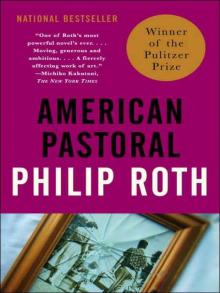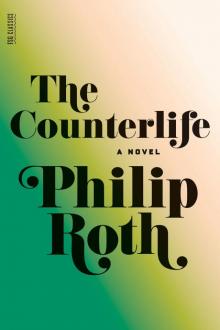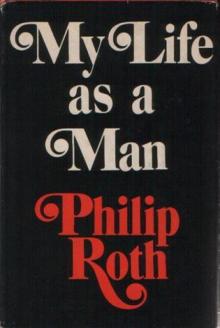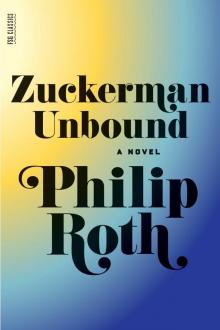- Home
- Philip Roth
The Professor of Desire Page 11
The Professor of Desire Read online
Page 11
“Yes.”
“Why?” he cries.
“To keep me afloat. To figure things out. To have someone to talk to … confidentially.”
“Why not a wife to talk to? That’s what a wife is for! I mean this time a real wife, not somebody who it must have cost you your whole school salary just to pay the beauty parlors. All this is all wrong, son. It is no way to live! A psychiatrist, and being on strong drugs, and people showing up at all hours—people who aren’t even people—”
“There is nothing to get worked up about.”
“There is everything to get worked up about.”
“No, no,” I say, lowering my voice. “Dad, there is only Mother…”
He puts a hand over his eyes and quietly begins to cry. With his other hand he makes a fist which he waves at me. “This is what I have had to be all my life! Without psychiatrists, without happy pills! I am a man who has never said die!”
And once again, the downstairs doorbell.
“Forget it. Let it ring. Dad, he’ll go away.”
“And then come back? I’ll crack his head open, and, believe me, then he’ll go away for good!”
Here the bedroom door opens and my mother appears in her nightgown. “Who are you cracking in the head?”
“Some lousy stinking fairy who won’t leave him alone!”
The bell again: two shorts, a long; two shorts, a long. Wally is drunk.
Her eyes tearful now, my tiny mother says, “And how often does this go on?”
“Not often.”
“But—why don’t you report him?”
“Because by the time the police come he’d be gone. You don’t want the police for something like this.”
“And you swear to me,” says my father, “this is nobody you know?”
“I swear to you.”
My mother comes into the living room and sits beside me. She takes my hand and clutches it. The three of us listen to the bell—mother, father, and son.
“You know what would fix the son of a bitch once and for all?” my father says. “Boiling water.”
“Abe!” cries my mother.
“But it would teach him where he don’t belong!”
“Dad, you mustn’t make too much of it.”
“And don’t you make so little! Why do you hang around with such people?”
“But I don’t.”
“Then why do you live in a place like this, where they show up and make trouble for you? Do you need more trouble still?”
“Calm down, please,” says my mother. “It isn’t his fault some maniac rings his doorbell. This is New York. He told you. This is what happens.”
“That doesn’t mean you leave yourself unprotected, Belle!” Jumping up from his chair, he rushes to the intercom. “Hey! You!” he shouts. “Cut it out! This is David’s father—!”
Stroking her arm—already skeletal—I whisper, “It’s okay, it’s all right, he’s not working the thing right anyway. Don’t worry, Ma, please—the fellow can’t even hear him.”
“—you want third-degree burns, we’ll give them to you! Do what you want to do in some gutter somewhere, but if you know what’s good for you, don’t come near my son!”
Two months later, in the hospital in Kingston, my mother dies. After the funeral guests have all left, my father urges me to take the food she has frozen for me only the month before, the last things cooked by her on this earth. I say, “And what are you going to eat?” “I was a short-order man before you were even born. Take it. Take what she made for you.” “Dad, how are you going to live here by yourself? How are you possibly going to manage the season? Why did you shoo everybody away? Don’t be so brave. You can’t stay up here alone.” “I can look after myself fine. Her going is not something we didn’t expect. Please, take it. Take it all. She wanted you to. She said whenever she remembered the inside of your refrigerator, she saw red. She cooked for you,” he says, his voice trembling, “and then she went away.” He begins to sob. I put my arms around him. “Nobody understood her,” he says, “the guests, never, never. She was a good person, Davey. When she was young, everything thrilled her, the littlest things even. She had a nervous nature only when the summer got hectic and out of control. So they made fun of her. But do you remember the winter? The peace and the quiet? The fun we had? Remember the letters at night?” Those words do it: for the first time since her death the morning before, I break down completely. “Of course I do, sure I do.” “Oh, sonny, that’s when she was herself. Only who knew it?” “We did,” I tell him, but he repeats, with an angry sob, “And who knew it!”
He carries the frozen food in a shopping bag out to my car. “Here, please, in her memory.” And so I return to New York with the half-dozen containers each bearing the same typewritten label: “Tongue with Grandma’s famous raisin sauce—2 portions.”
Within a week, I am driving back up to the country again, this time with my Uncle Larry, to take my father to Cedarhurst, where he will move in with his brother and sister-in-law. Though only temporarily, he says while we pack his suitcase in the car; just till he is over the shock. In a few days he is sure he will be himself. He has to be, that’s all there is to it. “I’ve been working since I’m fourteen years old. You don’t give in to a thing like this,” he says. “You tighten your belt and you go on.” Besides, it is winter, and there is always the risk up there of fire. Yes, the handyman and his wife will be living on the grounds, but that is no guarantee against the possibility of the hotel burning down in his absence.
It is true, of course, that dozens of mysterious fires have broken out in abandoned hotels and boardinghouses ever since the region began to pass out of fashion as a Jewish summer resort at about the time I was going off to college, but as he and my mother have been able, even in recent years, to hang on to a remnant of their aging clientele and to keep the main house open and the grounds respectable-looking, the arsonists had never before seemed to him a real threat. But now on the drive down the Thruway they are all he can think about. He names for my uncle and me the local hoodlums—“Men, thirty- and forty-year-old men!”—whom he has always suspected of setting the fires. “No, no,” he says to my uncle, who has offered his standard analysis as to where the trouble begins, “not even anti-Semites. Too stupid even for that! Just plain demented no-good idiots, fit for the lunatic asylum. Just people who like to see flames! And when it is in ashes, you know who they will accuse? I’ve seen it a dozen times. Me! That I did it for the insurance money! Because my wife is gone and I want to get out! The blame will fall on my good name! And half the time you know who else I sometimes think that does it? The volunteer fire fighters themselves! Yes—so they can rush out in the fire engines in the middle of the night and ride up and down the mountain in their helmets and boots!”
Even after he is comfortably installed in what used to be Lorraine’s bedroom, there is no calming his fears for the empire built of his sweat and his blood. Every night I call him on the phone and he tells me he cannot get to sleep for worrying about a fire. And he has other things to worry about now as well. “That fairy never came back, did he?” “No,” I say, knowing it best to lie. “See—it paid to threaten him. Unfortunately that’s all some people understand, is the fist,” says my father, who has never struck another person in his life. “And how are Uncle Larry and Aunt Sylvia?” I ask. “Wonderful. They couldn’t be kinder. Every other word is ‘Stay.’” “Well, that sounds reassuring,” I say. But no, another ten days, he tells me, and the worst of being without her will be over. Has to be. He has to get back up there while the damn place is still in one piece!
And then it is another five days, and then another, until at last, following an emotional Sunday car ride alone with me, he agrees to put the Hungarian Royale up for sale. His face in his hands, he says, “But I never said die in my life.” “There’s no shame in it, Dad. Things have just changed.” “But I don’t give up,” he cries. “Nobody is going to see it that way,” I say, and drive him
back to his brother’s.
And during this time hardly a night passes when I do not think about the girl I knew for barely two months back when I was a twenty-two-year-old sexual prodigy, the girl who wore a locket around her neck with her father’s picture in it. I even think of writing to her, in care of her parents. I even get up out of bed and search through my papers, looking for the Stockholm address. But by now Elisabeth must certainly be married and a mother two or three times over, and assuredly she does not think of me. No woman alive thinks of me, certainly not with love.
* * *
Though my department chairman Arthur Schonbrunn is a handsome and exquisitely groomed middle-aged man of unflagging charm and punctiliousness—as adroit and gracious a social being as I have ever seen in action—his wife, Deborah, is someone for whom I have never been able to work up much enthusiasm, even when I was Arthur’s favorite graduate student and she was frequently my affectionate and hospitable hostess. In those first years at Stanford, I used to spend a certain amount of my time, in fact, trying to figure out what bound a man so scrupulous about the amenities, so tirelessly concerned to oppose, from the highest principles, the burgeoning political assaults upon university curriculum—what bound such a man of conscience to a woman whose very favorite public performance was in the role of the dizzy dame whose beguiling charm is her reckless and impudent “candor”? The very first time I was invited by Arthur to have dinner with the two of them, I remember thinking at the end of the evening’s conversation—conversation consisting largely of Deborah’s coquettishly “outrageous” chatter—“This is surely the loneliest man alive.” How pained and disenchanted I was at twenty-three by this first look into my fatherly professor’s domestic life … only to be told by Arthur the following day about his wife’s “wonderful powers of observation” and her “gift” for “getting right to the heart of the problem.” And, along these lines, I remember another night, years later, when Arthur and I were working late in our offices—that is, Arthur was at work, while I was immobile at my desk, hopeless as usual about the loveless impasse Helen and I had reached and hadn’t the strength or the courage to resolve. When Arthur saw me apparently looking even more benumbed than usual, he came in and, until 3 a.m., tried his best to protect me from the crazier sort of solutions that might enter the head of a dreadfully unhappy husband having trouble getting himself to go home. Time and again he reminded me of the fine piece of work my thesis had been. The important thing now was to get back to revising it for book publication. Indeed, much that Arthur said to me that night sounded very like what Dr. Klinger was eventually to say to me about me, my work, and Helen. And I, in turn, poured out my grievances, and at one point lowered my face to my desk and wept. “I figured it was that bad,” said Arthur. “We both did. But much as we care for you, we never felt it was our business to say anything. We’ve had enough experience by now to know that always comes between friends, sooner or later. But still there were days when I wanted to shake you for being such a fool. You don’t know how many times I talked to Debbie about what could be done to get you to save yourself from all this unhappiness. Nothing was more upsetting for us than remembering what you’d been like when you first got here, and then seeing what was happening to you with her. But I couldn’t do a thing, David, unless you came to me—and that’s not how you go about things. You’re someone who goes so far with people, and no further, and the result is that you’re rather more alone with yourself than many people are. I’m not so unlike that myself.”
Near the end of his vigil—and for the first time ever—Arthur spoke about his own personal life almost as though we were men of the same age and rank. In his twenties, when he was an instructor at Minnesota, he too had been involved with “a wildly neurotic and destructive woman.” Scandalous public quarrels, two harrowing abortions, despair so enormous that he had actually come to think that suicide was the only way he might ever be able to extricate himself from his confusion and pain. He showed me a small scar on his hand, where this mad, pathetic little librarian, whom he could not stand and yet could not leave, had once stabbed him with a table fork at breakfast … And while Arthur tried to give me hope (and guidance) by associating his own early misfortune—and subsequent recovery—with what I was going through, I only wanted to say, “But how dare you? What do you call what you have now? Debbie is so common; her spontaneity so much guile-filled playacting; her candor so much tactless showing-off; capricious for the company; devilish for Daddy—Arthur, none of it means a thing, audacious behavior with nothing at stake! While Helen—my God, Helen is a hundred times, Helen is a thousand times…” But of course I rose to no such heights of virtuous indignation, uttered no words so foolish as these about the falsity and shallowness of his wife as against the integrity, intelligence, charm, beauty, and bravery of mine—uxoriousness, after all, being his line, and certainly that night, dreams of uxoricide being somewhat more like mine.
Is this chivalry of Arthur’s to be pitied or envied? Is my former mentor and current benefactor a little bit of a liar, a little bit of a masochist, or is he just in love? Or is it that Debbie, with her slightly shrill kittenishness and vaguely slatternly good looks, is the touch of the disreputable that makes bearable an otherwise stiflingly decorous life?
“Vizzied” is the diagnosis rendered by our resident poet, Ralph Baumgarten: “vizzied” or “vizzified”—both adjectives deriving from “vizzy,” an uncommon noun of Baumgarten’s strewn throughout his verse, rhyming with “fizzy” and “tizzy,” closely related to “fuzzy” and “buzz,” and referring, of course, to the pudenda. The vizz-ridden—to this class of husbands is Arthur Schonbrunn consigned by the unmarried poet—are those who slavishly conform to standards of propriety and respectability which, as Baumgarten sees it, have been laid down by generations of women to disarm and domesticate men. Of which domestication the poet himself is clearly having none. I tend to agree with Baumgarten that it is in part because of his own decidedly undeferential attitude toward the other gender—and his sexual predilections generally—that the young literary roughneck is not to be reappointed when his contract here runs out. However, if he has, by his manner, earned the disdain of certain of our colleagues and their wives, it has not caused him to be any less flagrant about what he likes and how he likes it. For him flagrancy appears to be much of the fun. “Picked up a girl at the Modern Museum, and on our way out we ran into your pals, Kepesh. Debbie hustled the girl off to the ladies’ room to get the latest lowdown on me, and Arthur, in the course of his pleasantries, asked how long Rita and I had been friends. I told him about an hour and a half. I said we were leaving because the museum seemed to afford no comfortable corner where we might go down on each other. But what, I wondered, did Arthur make of her plump little behind? Well, he wouldn’t tell me. Gave me a lecture on compassion, instead.”
No arguing that Baumgarten throws a rather large net out to catch his little minnows in. When the two of us are walking on the streets of Manhattan, hardly a woman under fifty or a girl over fifteen passes by from whom he does not attempt to extract information that he manages to intimate is absolutely vital to his survival. “Gee, what a nice coat!” he says, flashing his grin at a young woman in a ratty fur pushing a baby carriage. “Oh, thanks.” “May I ask what it’s made of? What kind of an animal was that? I never saw a coat quite like that before.” “This? It’s a fake.” “Really?” Within minutes he is barely this side of stupefaction (not all of it feigned, either) at learning that this young woman in the fake fur is already divorced, the mother of three small children, and a dropout from the University of Two Thousand Miles Away. To me, standing self-consciously off to the side, he calls, “Did you hear that, Dave? This is Alice. Alice was born in Montana—yet here she is wheeling a baby carriage in New York.” And no less than Baumgarten, the young mother herself now seems a little wonderstruck to have been transported such a distance in a mere twenty-four years.
Success with strangers, Baumgarten informs me,
resides in never asking a question of them that can’t be answered without thinking, and then being wholly attentive to the reply, no matter how pedestrian. “You remember your James, Kepesh—‘Dramatize, dramatize.’ Get these people to understand that who they are and where they’re from and what they wear is interesting. In a manner of speaking, momentous. That’s compassion. And, please, display no irony, will you? Your problem is you scare ’em off with your wonderful feel for the complexity of things. My experience is that the ordinary woman in the streets doesn’t cotton to irony, really. It’s irony, really, that pisses her off. She wants attention. She wants appreciation. She surely doesn’t want to match wits with you, boy. Save all that subtlety for your critical articles. When you get out there on the street, open up. That’s what streets are for.”
During my first months at the university I discover that when Baumgarten’s name comes up at faculty gatherings there is always someone around who cannot stand the sight of him, and is more than willing to say why. Debbie Schonbrunn holds that the “abomination-in-residence” would be comical were he not so—the word is a favorite of hers and Arthur’s—“destructive.” Of course in response I need say nothing: just drink my drink and start back to New York. “Oh, he’s not so bad,” I tell her. “In fact,” I add, “I sort of like him.” “And what is there to ‘like’ so?” Go home, Kepesh. That empty apartment is where you belong; between this predictable discussion and that faggy apartment, there is no doubt where you will be better off. “What is there to dislike so?” I reply. “Where do I begin?” asks Deborah; “his contempt for women, for one thing. He is a murderous, conscienceless womanizer. He hates women.” “Looks to me as though he rather likes them.” “David, you are being contrary and disingenuous, and just a little hostile, and I’m really not sure why. Ralph Baumgarten is an abomination and so is his poetry. I have never read anything so dehumanized in my life. Read that first book of his and see for yourself just how much he likes girls.” “Well, I haven’t read him yet”—a lie—“but we’ve had lunch a few times. He isn’t so reprehensible, as far as I can see. Could be, Deborah, that the poetry isn’t exactly the man.” “Ah, but it is: mean and smug and overbearing and actually quite stupid. And what about ‘the man’? That walk of his, that glide; those army clothes; that face—well, actually he hasn’t got a face, has he? Just mean, flat eyes and that surly grin. The mystery is how any girl can even go near him.” “Well, he must have something.” “Or they lack something. Really, you have such innate elegance and he is a carrion vulture right down to his claws, and why you would want even to associate with him…” “I get along with him,” I say, shrugging my shoulders, and now put down my drink and go on home.

 American Pastoral
American Pastoral The plot against America
The plot against America The Human Stain
The Human Stain Nemesis n-4
Nemesis n-4 Sabbath’s Theater
Sabbath’s Theater The Professor of Desire
The Professor of Desire Our Gang
Our Gang The Breast
The Breast Operation Shylock
Operation Shylock The Dying Animal
The Dying Animal Letting Go
Letting Go The Counterlife
The Counterlife Everyman
Everyman Nemesis
Nemesis Exit Ghost
Exit Ghost Portnoy's Complaint
Portnoy's Complaint My Life as a Man
My Life as a Man I Married a Communist
I Married a Communist The Anatomy Lesson
The Anatomy Lesson The Great American Novel
The Great American Novel Shop Talk
Shop Talk The Humbling
The Humbling Zuckerman Unbound
Zuckerman Unbound When She Was Good
When She Was Good The Prague Orgy
The Prague Orgy American Pastoral (Nathan Zuckerman)
American Pastoral (Nathan Zuckerman) Goodbye, Columbus
Goodbye, Columbus Reading Myself and Others
Reading Myself and Others